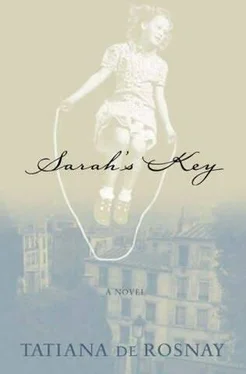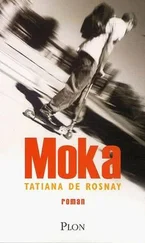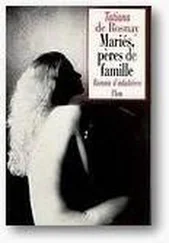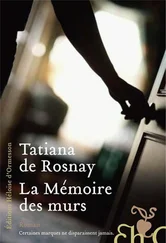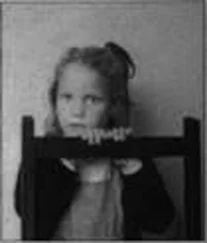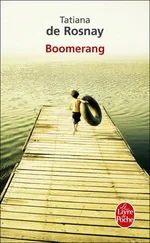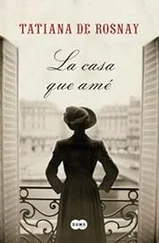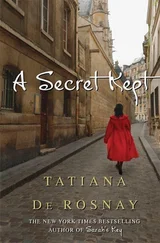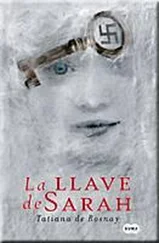I watched his fingers play with the rim of his coffee cup. I felt it hard to look him fully in the face.
“I went there to find their names. And there they were. Wladyslaw and Rywka Starzynksi. My grandparents. I felt the same peace I had found at Auschwitz. The same pain. I felt grateful that they were remembered, that the French remembered them and honored them this way. There were people crying in front of that wall, Julia. Old people, young people, people of my age, touching the wall with their hands, and crying.”
He paused, breathed carefully through his mouth. I kept my eyes on the cup, on his fingers. The baby’s giraffe squeaked but we hardly heard it.
“Chirac gave a speech. I did not understand it, of course. I looked it up later on the Internet and read the translation. A good speech. Urging people to remember France’s responsibility during the Vel’ d’Hiv’ roundup and what followed. Chirac pronounced the same words my mother had written at the end of her letter. Zakhor, Al Tichkah. Remember. Never forget. In Hebrew.”
He bent down and retrieved a large manila envelope from the backpack at his feet. He handed it to me.
“These are my photos of her, I wanted to show them to you. I suddenly realized I didn’t know who my mother was, Julia. I mean, I knew what she looked like, I knew her face, her smile, but nothing about her inner life.”
I wiped the maple syrup off my fingers in order to be able to handle them. Sarah, on her wedding day. Tall, slender, her small smile, her secret eyes. Sarah, cradling William as a baby. Sarah with William as a toddler, holding him by the hand. Sarah, in her thirties, wearing an emerald ball dress. And Sarah, just before her death, a large color close-up. Her hair was gray, I noticed. Prematurely gray and oddly becoming. Like his, now.
“I remember her as being tall, and slim, and silent,” said William as I looked at each photo with growing emotion. “She didn’t laugh much, but she was an intense person, and a loving mother. But no one ever mentioned suicide after her death. Ever. Not even Dad. I guess Dad never read the notebook. No one did. Maybe he found it a long time after her death. We all thought it was an accident. No one knew who my mother was, Julia. Not even me. And that’s what I still find so hard to live with. What brought her to her death, on that cold snowy day. How she made that decision. Why we never knew anything about her past. Why she chose not to tell my father. Why she kept all her suffering, all her pain, to herself.”
“These are beautiful pictures,” I said at last. “Thank you for bringing them.”
I paused.
“There’s something I must ask you,” I said, putting the photos away, gathering courage and looking at him at last.
“Go ahead.”
“No harsh feelings against me?” I asked with a weak smile. “I’ve been feeling like I destroyed your life.”
He grinned.
“No harsh feelings, Julia. I just needed to think. To understand. To put all the pieces back together. It took a while. That’s why you never heard from me during all that time.”
I felt relief sweep over me.
“But I knew where you were all along.” He smiled. “Spent quite some time keeping track of you.” Mom, he knows you live here now. He’s looked you up as well. He knows what you do here, he knows where you live. “When did you move to New York exactly?” he asked.
“A little while after the baby was born. Spring 2003.”
“Why did you leave Paris? If you don’t mind telling me…”
I gave a rueful half smile.
“My marriage had fallen apart. I’d just had this baby. I couldn’t bring myself to live in the rue de Saintonge apartment after everything that had happened there. And I felt like moving back to the States.”
“So how did you actually do it?”
“We stayed with my sister for a while, on the Upper East Side, then she found me a place to sublet from one of her friends. And my ex-boss found me a great job. What about you?”
“Same story. Life in Lucca just didn’t seem possible. And my wife and I…” His voice trailed off. He made a little gesture with his fingers as if to say farewell, bye-bye. “I lived here as a boy, before Roxbury. And the idea had been passing through my head, for a while. So I finally got ’round to it. I stayed at first with one of my oldest friends, in Brooklyn, then I found a place in the Village. I do the same job here. Food critic.”
William’s phone rang. The girlfriend, again. I turned away, trying to give him the privacy he needed. He finally put the phone down.
“She’s a little possessive,” he said, sheepishly. “I think I’ll turn it off for a while.”
He fumbled with the phone.
“How long have you been together?”
“A couple of months.” He looked at me. “What about you? Are you seeing someone?”
“Yes, I am.” I thought of Neil’s courteous, bland smile. His careful gestures. The routine sex. I nearly added it was not important, that it was just for the company, because I could not stand being alone, because every night I thought of him, William, and of his mother, every single night, for the past two-and-a-half years, but I kept my mouth shut. I just said, “He’s a nice person. Divorced. A lawyer.”
William ordered fresh coffee. As he poured out mine, I noticed, once again, the beauty of his hands, his long, tapered fingers.
“About six months after our last meeting,” he said, “I went back to the rue de Saintonge. I had to see you. To talk to you. I didn’t know where to reach you, I had no number for you and couldn’t remember your husband’s name, so I couldn’t even look you up in the phone book. I thought you’d still be living there. I had no idea you’d moved.”
He paused, ran a hand through his thick, silver hair.
“I read all about the Vel’ d’Hiv’ roundup, I’d been to Beaune-la-Rolande, and to the street the stadium was on. I’d been to see Gaspard and Nicolas Dufaure. They took me to my uncle’s grave, in the Orléans cemetery. Such kind men. But it was difficult, hard to go through. And I wished you’d been there with me. I should never have done all that alone, I should have said yes when you asked to come along.”
“Maybe I should have insisted,” I said.
“I should have listened to you. It was too much to bear alone. And then, when I finally went back to the rue de Saintonge, and when those unknown people opened your door, I felt you’d let me down.”
He lowered his eyes. I set my coffee cup back in its saucer, resentment sweeping through me. How could he, I thought, after all I’d done for him, after all the time, the effort, the pain, the emptiness?
He must have deciphered something in my face because he quickly put his hand on my sleeve.
“I’m sorry I said that,” he murmured.
“I never let you down, William.”
My voice sounded stiff.
“I know that, Julia. I’m sorry.”
His was deep, vibrant.
I relaxed. Managed a smile. We sipped in silence. Sometimes our knees brushed against each other under the table. It felt natural, being with him. As if we had been doing this for years. As if this was not just the third time in our lives we were seeing each other.
“Is your ex-husband OK about you living here with the kids?” he asked.
I shrugged. I looked down at the child who’d fallen asleep in her stroller.
“It wasn’t easy. But he’s in love with someone else. Has been for some time. That helped. He doesn’t see the girls much, though. He comes here from time to time, and Zoë spends her vacations in France.”
“Same thing with my ex-wife. She’s had a new child. A boy. I go to Lucca as often as I can to see my daughters. Or they come here, but more rarely. They’re quite grown up now.”
Читать дальше
